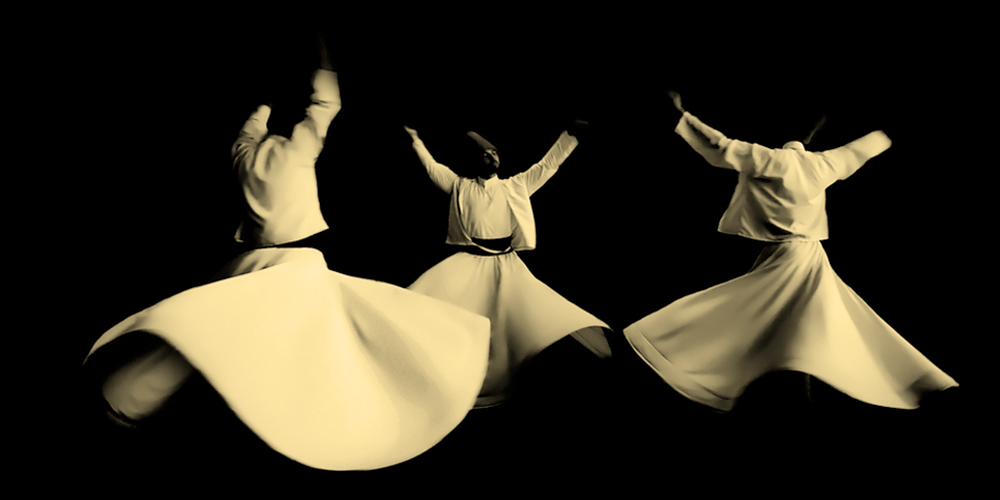The Philosophy of Love…
800th Anniversary of Mawlana was celebrated by Unesco
The world of Rumi is neither exclusively the world of a Sufi, nor the world of a Hindu, nor a Jew, nor a Christian; it is a state of an evolved human. A human who is not bound by cultural limitations; a one who touches every one of us. Today Rumi’s poems can be heard in churches, synagogues, Zen monasteries, as well as in the downtown. Barely known in the West as recently as 15 years ago, Rumi is now one of the most widely read poets in America.
In conformity with its mission, UNESCO was associated with the celebration, in 2007, of the eight hundredth anniversary of “Mawlana Jalal-ud-Din Balkhi-Rumi‘s” birth. The commemoration at UNESCO itself took place on 6 September 2007.
UNESCO issued a medal in Rumi’s name in the hope that it would prove an encouragement to those who are engaged in research on and dissemination of Rumi’s ideas and ideals, which would, in turn, enhance the diffusion of the ideals of UNESCO.
On 30 September 2007, Turkey celebrated Rumi’s eight-hundredth birthday with a giant Whirling Dervish ritual performance of the samāʿ, which was televised using forty-eight cameras and broadcast live in eight countries. Ertugrul Gunay, of the Ministry of Culture and Tourism of Turkey, stated, “Three hundred dervishes are scheduled to take part in this ritual, making it the largest performance of sama in history.”
The philosophy of love!
Rumi was an evolutionary thinker in the sense that he believed that the spirit after devolution from the divine Ego undergoes an evolutionary process by which it comes nearer and nearer to the same divine Ego. All matter in the universe obeys this law and this movement is due to an inbuilt urge (which Rumi calls “love”) to evolve and seek enjoinment with the divinity from which it has emerged. Evolution into a human being from an animal is only one stage in this process. The doctrine of the Fall of Adam is reinterpreted as the devolution of the Ego from the universal ground of divinity and is a universal, cosmic phenomenon. The French philosopher Henri Bergson’s idea of life being creative and evolutionary is similar, though unlike Bergson, Rumi believes that there is a specific goal to the process: the attainment of God. For Rumi, God is the ground as well as the goal of all existence.
Nicholson has seen Rumi’s philoosphy as a Neo-Platonic doctrine: the universal soul working through the various spheres of being, a doctrine introduced into Islam by Muslim philosophers like Al Farabi and being related at the same time to Ibn Sina’s idea of love as the magnetically working power by which life is driven into an upward trend.
For Rumi, religion was mostly a personal experience and not limited to logical arguments or perceptions of the senses. Creative love, or the urge to rejoin the spirit to divinity, was the goal towards which every thing moves. The dignity of life, in particular human life (which is conscious of its divine origin and goal), was important.
Rumi’s Poetry
Rumi’s poetry forms the basis of much classical Iranian and Afghan music (Eastern-Persian, Tajik-Hazara music). Contemporary classical interpretations of his poetry are made by Muhammad Reza Shajarian, Shahram Nazeri, Davood Azad (the three from Iran) and Ustad Mohammad Hashem Cheshti (Afghanistan). Today, Rumi’s legacy is expanding in the West as well through the work of translators and performers such as Shahram Shiva who has been presenting bilingual Persian/English Rumi events in the US since 1993. To many modern Westerners, his teachings are one of the best introductions to the philosophy and practice of Sufism. Pakistan’s National Poet, Muhammad Iqbal, was also inspired by Rumi’s works and considered him to be his spiritual leader, addressing him as “Pir Rumi” in his poems (the honorific Pir literally means “old man”, but in the sufi/mystic context it means founder, master, or guide).
Barely known in the West as recently as 15 years ago, Rumi is now one of the most widely read poets in America. His is an exciting new literary and philosophical force. “Rumi deals with the human condition and that is always relevant,” says Shahram Shiva. “Rumi is able to verbalize the highly personal and often confusing world of personal growth and development in a very clear and direct fashion. He does not offend anyone, and he includes everyone. The world of Rumi is neither exclusively the world of a Sufi, nor the world of a Hindu, nor a Jew, nor a Christian; it is a state of an evolved human. A human who is not bound by cultural limitations; a one who touches every one of us. Today Rumi’s poems can be heard in churches, synagogues, Zen monasteries, as well as in the downtown New York art/performance/music scene.” According to Professor Majid M. Naini, “Rumi’s life and transformation provide true testimony and proof that people of all religions and backgrounds can live together in peace and harmony. Rumi’s visions, words, and life teach us how to reach inner peace and happiness so we can finally stop the continual stream of hostility and hatred and achieve true global peace and harmony.”
Rumi’s work has been translated into many of the world’s languages, including Russian, German, Urdu, Turkish, Arabic, Bengali, French, Italian, and Spanish, and is being presented in a growing number of formats, including concerts, workshops, readings, dance performances, and other artistic creations. The English interpretations of Rumi’s poetry by Coleman Barks have sold more than half a million copies worldwide, and Rumi is one of the most widely read poets in the United States.

